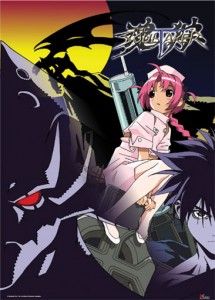Ask John: What’s John’s Opinion of Soul Taker?

Question:
I want to ask John what his thoughts are on Soultaker anime created by Tatsunoko Productions. I always thought it was underrated highly. Most people don’t like it, not because its crap but either because of the way it is presented (editing) and/or the confusing story which sometimes requires repeated viewing. I find it more interesting than Karas which had some of the same staff on it.
Answer:
Please excuse any vagueness in my response. It’s been 7 years since I watched the Soul Taker television series, so my recollection of it in detail is spotty. Soul Taker is one among a number of interesting anime titles formerly distributed in America but sadly no longer in distribution. It’s a title comparable to other unusual, experimental works like Boogiepop Phantom, Yamamoto Yohko, and NieA_7 that never quite achieved the great critical acclaim or popularity of a title like Serial Experiments Lain. In fact, Soul Taker may deserve more recognition now for being the antecedent of the more successful spin-off Nurse Witch Komugi-chan and the (somewhat) more popular and successful Karas OVA series.
While Soul Taker never really took off on its own, supporting character Komugi Nakahara got her own alternate continuity parody show that spawned two OVA series, video games, and successful marketing and merchandising. Tatsunoko Productions animators that worked on the 2001 Soul Taker television anime, including Kenji Nakamura, Kenji Hayama, and Keiichi Satou later re-employed the same post-modern neo-noir super hero tropes of Soul Taker in the more technically advanced 2005 Karas OVA series. While Soul Taker draws its inspiration from a wide variety of sources while aiming for something original, Karas merged stunning visual effects with inspiration from Soul Taker and a firm foundation in Tatsunoko’s familiar trademark hero anime like Gatchaman and Casshern, resulting in a production that was more accessible to viewers and better received than Soul Taker.
Largely because of major narrative weaknesses, Soul Taker succeeds better as an assortment of images, scenes, and atmospheric style than as a structured, linear narrative. Director Akiyuki Shinbo applied the full force of his distinctive visual style to the show – a style possibly more familiar to contemporary anime fans from anime including Tsukuyomi ~Moon Phase~, Sayonara Zetsubou-sensei, and Negima!? Character designer Akio Watanabe’s similarly distinctive character art is attractive and memorable. The show begins strong with an engaging mystery and enigmatic characters. But as it unfolds and broadens its focus outward from protagonist Date Kyousuke to include supporting characters and shifts its thematic focus from noirish mystery to familial conflict, it loses urgency and direction. As a result, the first half of Soul Taker is much more memorable and interesting than the later half.
The show begins with the memorable imagery of a murder victim hanging upside down in a chapel – an image almost certainly drawn from the beginning of Dario Argento’s acclaimed 1977 horror film Susperia. The “heroic bloodshed” inspired cemetery shootouts from episode 3 are among anime’s most exciting. But tied up with these eclectic inspirations are a very obvious parallel with Yoshiki Takaya’s Bio-Booster Armor Guyver, and a revelatory conflict so obviously lifted from The Empire Strikes Back that it feels lazy and disheartening.
I’ve never thought of Soul Taker as a failure, but it is a show that regrettably crumbles under the weight of its own pretense, failing to live up to its early promise. From a purely visual perspective, Soul Taker is consistently fascinating and stylish. It’s an excellent example of the unique creative dynamism possible when anime is allowed to indulge its most baroque visual inclinations. But Soul Taker really is memorable primarily as an interesting footnote in the history of anime. It’s a title that I’d like to see recirculated in American release just so American viewers can reacquaint themselves with it. But it’s not a forgotten masterpiece. Rather, Soul Taker is a mildly engaging and mildly impressive anime work that rightfully resides in a position of not quite obscurity.
Add a Comment
You must be logged in to post a comment.


This IS a very interesting show if you are prepaird to pay very close attention to it.
Also if you want to see it you can Buy it from Right Stuf, they have lots of copies at $5 each. So go on treat yourself.
When I first saw this anime, I hated it. It was incredibly hard to follow, never gave viewers a clear image of who or what was on screen and when, and as you said, is a bit inconsistent on top of it all.
But, that all said, I stuck with it and soon learned how exactly to “look” at the series in order to understand what was going on without cocking my head at an angle. I love Shinbo’s work and I think his use of shadow has evolved over the years. I wouldn’t fault anyone for not liking this anime based on its visual presentation alone, but the director does put some effort in trying to develop the anime’s characters through alternating editing lenses.
character designer / animation director Akio Watanabe (Poyoyon Rock) & director Akiyuki Shinbo have a new anime seres coming up, “Bakemonogatari”
Hah!! When I submitted that question I never thought you would answer it John. As someone who fell in love with anime through Soultaker I was happy to read your opinion regarding the show. Most critics who reviewed this when it came out and even now just don’t understand this show at all, so it was interesting to read thoughts on a show that aren’t overly negative for reasons that aren’t explained properly.
Thankyou I appreciate your answer.